|
View: 6021|Reply: 6
|
[Tokoh]
Mengapa negara Barat membenci Hitler sehingga ke hari ini
[Copy link]
|
|
|
Hitler's Barter System the Cause of WW2 -
 ... Defying the Jewish Money Monopoly ... Defying the Jewish Money Monopoly
General Robert Wood testified that in 1936 Churchill told him that
Germany is getting too strong and must be smashed. (p. 130).
For what reason? Bernard Baruch tells us. After an interview
with Rosevelt in September 1939, Baruch released a report to the
press in which he said:
"If we keep our prices down, there is no reason why we
shouldn't get the customers from belligerent nations that they
have had to drop because of the war. In that event Germany's
barter system will be destroyed."
(N.Y. Times, 14th Sept. 1939)
Germany was trying to escape the entanglements of world debt.
England was quite willing to lend money to buy raw materials but
Germany insisted upon exchanging goods for goods. Germany would
not be drawn into the system of increasing debt, booms and slumps.
The London Times stated that Germany's barter system made her an
aggressor in the world market:
"One of the fundamental causes of this war has been the
unrelaxing efforts of Germany since 1918 to secure wide
enough foreign markets to straighten her finances at the very
time when all her competitors were forced by their own debts to
adopt exactly the same course. Continuous friction was in-
evitable. Germany adopted a new monetary policy ... after which
Germany ceased to experience any financial difficulty."
In England the people suffer the burdens of heavy and increasing
taxation, but in Germany, the Times reports:
"Nothing is ever heard of the necessity of increasing tax-
ation, compulsory savings, or the issue of enormous public war
loans. Quite the contrary. Recently an important tax was
abolished. Public savings bank deposits touch new monthly
records again and again. Money is so plentiful that the interest
rate on Reich loans could recently be reduced from 4-1/2 to 4 per
cent.
These changes may well call for drastic readjustments in our
established conventions. A hidebound persistence in methods
and doctrines which were sound fifty years ago may easily
prove as costly in the financial and ecomomic field as actual
war. It might not lose the war; it would certainly lose the
peace."
(London Times, October 11 and 12 and November 13, 1940).
"Germany was trying to break the credit ring of the money
monopolists by the force of economic sanity and that was un-
forgivable. She was acting like a worker who went on strike against
system which deprived him of adequate food supplies though he
as quite willing to exchange his labor to pay for them.
"In 1937 Hitler said:
'Germany will enter into no obligations to pay for her im-
ports than she is capable of fulfilling. The German Govern-
ment thus takes the standpoint of the respectable mer-
chant who keeps his orders in harmony with his power to
pay. We laugh at the time when our national economists held
the view that the value of a currency is regulated by the gold
and securities lying in the vaults of a State Bank; and more
especially we laugh at the theory that its value was guaranteed
thereby. We have instead come to learn that the value of a cur-
rency lies in the productive capacity of a nation.
"The world financial monopoly stood aghast. If Germany succeeded
in her plan of economic penetration, other nations might follow
per example. The whole world would then exchange goods for goods
in a basis of equality and good fellowship. No one would want to
borrow and the financial pyramid of debt, from the apex of which
Almighty Finance ruled the world, would collapse. Humanity would
be well fed, but the financiers would lose their power.
"If the German monetary experiment had been allowed to develop
on the basis of a friendly exchange of goods it would have provided
the world with useful information to assist it in solving its commercial problems.
What was a laudable effort on the part of Germany
has become a world war -- a war of ideas in which Hitler strives to
form a European economic monopoly opposed to the financial
monopolies of the world.
"Statesmen began to prepare the public mind for war. No mention
was made of the real causes of the crisis -- the bitter scramble for
world markets, the trickery and inhuman methods used to obtain
spheres of influence for surplus investments and for increasing the
burden of world debt. Statesmen again were preparing to sacrifice
the youth of their country on the bloody alter of Mammon.
As in peace, so in war. Humanity must be sacrificed to save a worthless
economic system. .
"Once again the peoples were told that if they destroyed the
leader of the German nation all would be well with the world. Ger-
nany worshipped its leader. Britain trusted its Government. Both
peoples believed their leaders would save the world. It was a
tragedy of faith in men. One nation has to fight for a new economic
and political system the other to preserve the old ones.
Source: AMERICAN MANIFEST DESTINY AND THE HOLOCAUSTS, BY CONRAD GRIEB (Liberty Bell, 1978), pp 233-236
It is a dangerous game to place people above profits. Like Abe Lincoln and President John F. Kennedy, not long after he defied the interests of international finance Adolf Hitler was dead.
The death of Twenty to Fifty Million white folks is nothing to the Jews when it comes to protecting thier "rackets".
Much, much more here:
 ....https://www.stormfront.org/forum/t81231/ ....https://www.stormfront.org/forum/t81231/
|
Rate
-
1
View Rating Log
-
|
|
|
|
|
|
|
|
|
|
|
When Hitler came to power, global Jewish organizations
were quick to organise economic warfare against Hitler's Germany
as a means of bringing the vibrant National Socialist state to its
knees.
Hitler was democratically elected Chancellor of Germany on January
30, 1933. That year was notable in the number of boycotts organised
throughout the world, most if not all provoked by Jewish interest
groups. The first Jewish declaration of war was pronounced on March 24, 1933.
Below are some very descriptive quotes from various sources worldwide:
[Start]
"JUDEA DECLARES WAR ON GERMANY."
_______ "Judea Declares War on Germany! Jews of all the World Unite! Boycott of German Goods! Mass Demonstrations!" - (Headlines in the Daily Express on March, 24th, 1933.)
_______ "March, 24th, (1933) Reich leaders realised that boycott agitation was accelerating, especially in Great Britain. Placards proclaiming 'Boycott German Goods' spread infectiously throughout London, and were now in the windows of the most exclusive West End shops. Automobiles bannering boycott placards slowly cruised through the retail districts alerting shoppers. Everywhere, store signs warned German salesmen not to enter. British Catholics had been urged by the Archbishop of Liverpool to join the protest.
"London's Daily Herald carried an interview with a prominent Jewish leader who admitted, 'The leaders are hanging back,' but the Jewish people are 'forcing its leaders on.' Already the boycott has damaged 'hundreds of thousands of pounds of German trade'." - (Edwin Black, Jewish author. The Transfer Agreement, p.34 )
_______ "Fifty-thousand were gathered (March,27th,1933) in and around Madison Square Garden, supportive rallies were at that moment waiting in Chicago, Washington, San Francisco, Houston, and about seven other American cities. At each supportive rally, thousands huddled around loudspeakers waiting for the Garden event, which would be broadcast live via radio to 200 additional cities across the country. At least 1 million Jews were participating nationwide. Perhaps another million Americans of non-Jewish descent heritage stood with them." - (Edwin Black, Jewish writer and author. The Transfer Agreement, p.42 )
_______ "Mass meetings throughout Poland - co-ordinated to the Congress rally - had voted to extend the Vilna boycott to all of Poland. The three most important Warsaw Jewish commercial organisations - passed binding resolutions to 'use the most radical means of defence by boycotting German imports.'
"In London, almost all Jewish shops in the Whitechapel district were displaying placards denying entry to German salesmen and affirming their anti-Nazi boycott. Teenagers patrolled the streets distributing handbills asking shoppers to boycott German goods....." - (Edwin Black, Jewish Writer and Author, The Transfer Agreement, p.46/47 )
_______ "War in Europe in 1934 was inevitable." - (H. Morgenthau, Hearst Press, U.S. September, 1933 )
_______ "The Israeli people around the world declare economic and financial war against Germany. Fourteen million Jews stand together as one man, to declare war against Germany. The Jewish wholesaler will forsake his firm, the banker his stock exchange, the merchant his commerce and the pauper his pitiful shed in order to join together in a holy war against Hitler's people." - (Daily Express, March,24th, 1933 )
_______ "Germany is our public enemy No.1. It is our object to declare war without mercy against her." (Bernart Lecache, President, Jewish World League )
_______ The next official declaration of war was issued in August, 1933, by Samuel Untermeyer, newly elected to the Presidency of the 'International Jewish Federation to Combat the Hitlerite Oppression of the Jews.' The declaration of (Jewish) war was disseminated throughout the world by the New York Times, on August 7th, 1933.
_______ "This declaration called the war against Germany, which was now determined a 'holy war'. This war was to be carried out against Germany to its conclusion, to her destruction." - (Dr. Scheidl, Geschichte der Verfemung Deutschlands )
_______ The International Jewish Boycott Conference assembled in Holland to discuss ways by which Jewish interests in Germany might be protected. Referring to the Jews as 'the aristocrats of the world', Samuel Untermeyer, the President of the World Jewish Economic Federation, said:
"Each of you, Jew and Gentile alike, who has not already enlisted in this sacred war should do so now and here. It is not sufficient that you should buy no goods made in Germany. You must refuse to deal with any merchant or shopkeeper who sells any German-made goods or who patronises German ships or shipping.... we will undermine the Hitler regime and bring the German people to their senses by destroying their export trade on which their very existence depends." - ( C.B.S, August,7th, 1933 )
_______ Joining with Samuel Untermeyer in calling for a war against Germany, Bernard Baruch, at the same time, was promoting preparations for war against Germany. 'I emphasised that the defeat of Germany and Japan and their elimination from world trade would give Britain a tremendous opportunity to swell her foreign commerce in both volume and profit." - ( Samuel Untermeyer, The Public Years, p.347 )
_______ "Hitler will have no war, but he will be forced to it, not this year, but later on." - ( Les Aniles, 1934 )
_______ By June, 1938, the American Hebrew was boasting that they had Jews in the foremost positions of influence in Britain, America and France, and that these "three sons of Israel will be sending the Nazi dictator to hell."
_______ "The fight against Germany has been carried out for months by every Jewish conference, trade organisation, by every Jew in the world.... we shall let loose a spiritual and a material war of the whole world against Germany." - (M. Jabotinsky, founder of Revisionist Zionism, Natcha Retch, January, 1934 )
_______ "We Jews are going to bring a war on Germany." - ( David A. Brown, National Chairman, United Jewish Campaign )
_______ "The world should cut off all relations with Germany; trade, social and diplomatic." - ( Sunday Express )
_______ "He (J.E Marcovitch, Egyptian newspaper magnate) had 'converted the whole Egyptian Press into a real battlefield against Hitlerianism'." ( Jewish Chronicle, 22nd, February, 1935 )
"There is only one power which really counts. The power of political pressure. We Jews are the most powerful people on earth, because we have this power, and we know how to apply it." - (Jewish Daily Bulletin, July,27th, 1935 )
_______ "Before the end of the year, an economic bloc of England, Russia, France and the U.S.A will be formed to bring the German and Italian economic systems to their knees." - ( Paul Dreyfus of Mulhausen, 'La Vio de Tanger' May, 15th,1938 )
_______ "A boycott throughout Europe of their export products by way of the retailer may undermine the present uncertain economic stability of several of the anti-Semitic countries." - ( Sunday Chronicle, January,2nd, 1938 )
THE EFFECT ON THE GERMAN ECONOMY
Between January and April, 1933, Germany's exports dropped by 10%. As the boycott organised by world Jewry spread, German trade was hit particularly hard and during the first quarter of 1933, Germany's vital exports were less than half its 1932 trade.
_______ "When the Reich could no longer pay its obligations, Germany would go bankrupt." - ( Edwin Black, Jewish writer/author, The Transfer Agreement, p.185 )
_______ "... if exports fell too low, Germany as a nation would again be faced with starvation ... How many months could Germany survive once the boycott became global, one commerce was re-routed around Germany? The boycotters adopted a slogan, 'Germany will crack this winter'." - (Edwin Black, Jewish writer/author, The Transfer Agreement, p.188 )
CONCLUSION
These declarations of war against what was undeniably a friendly state and a democratically elected government in its very infancy, caused the German people to react by calling for a ***one day boycott*** (April,1st, 1933) of Jewish businesses and goods.
Almost 70 years later, discerning readers can still see the writing on the wall. The power of the media to distort events is there for all to see, in every bookshop throughout the land. We are all familiar with the repetitive stories and pictures of this German boycott of Jewish goods; but the reasons for it are never mentioned, nor is the fact that it was ***a mere one day event***.
_______ "It (National Socialism) was condemned to war because it was a system which inevitably made enemies of Bolshevism and world capitalism." - ( Louis Marschalko; Hungarian writer-journalist and playwright )
_______ "The Jews, taken collectively, view this war as a holy war." - (The Daily Herald, No.7450, 1939 )
_______ "Even if we Jews are not physically at your side in the trenches, we are morally with you. This war is our war and you fight it with us." - (Schalom Asch, Les Nouvelles Litterairres, February,10th, 1940 )
_______ "This war is our business." - (Rabbi Dr. Stephen Wise, Defence in America, June, 1940 )
_______ "A few days after the British Declaration of War, Weizmann offered the British Government 2,000 men for use in the near East, altogether, an army of 100,000 Jewish fighters against Germany." - Dr. Scheidl, Geschichte der Verfemung Deutschlands
_______ "Jewish brothers of the whole world: Let the holy flame of vengeance burn more and more brightly in your hearts with every hour! Be ready to act at any minute! You must do everything in your power to destroy the economic resources of the fascists, no matter in what part of the world you live. Go among the most vital sections of the death-bringing industries of the Hitlerian hangmen and cripple them with every means at your disposal. Boycott their products everywhere! Struggle together with the noble, self-sacrificing partisans! Develop everywhere a fully effective propaganda for solidarity with, and an active support for the Soviet Union. Mankind wants to be freed of the brown plague. Do your duty in this holy war." - (International Conference of the Jews, Moscow, 1941 )
[End]
And these people were surprised that the German government of Adolf Hitler undertook steps in areas under their control - first in Germany proper and later in occupied Europe - to put an end to this security threat to the people of Germany and later Europe? The right of self-defense, one of the most basic and instinctual human rights dictated such a course! |
|
|
|
|
|
|
|
|
|
|
|
"Should Germany merchandise again in the next 50 years we have led this war (WW1) in vain."
- Winston Churchill in Times (1919)
The Israeli people around the world declare economic and financial war against Germany. Fourteen million Jews stand together as one man, to declare war against Germany. The Jewish wholesaler will forsake his firm, the banker his stock exchange, the merchant his commerce and the pauper his pitiful shed in order to join together in a holy war against Hitler's people."
- Daily Express (March 24, 1933)
"Each of you, Jew and Gentile alike, who has not already enlisted in this sacred war should do so now and here. It is not sufficient that you should buy no goods made in Germany. You must refuse to deal with any merchant or shopkeeper who sells any German-made goods or who patronises German ships or shipping.... we will undermine the Hitler regime and bring the German people to their senses by destroying their export trade on which their very existence depends."
- Samuel Undermeyer, in a Radio Broadcast on WABC, New York (August 6, 1933, reported in the New York Times, August 7, 1933)
"Joining with Samuel Untermeyer in calling for a war against Germany, Bernard Baruch, at the same time, was promoting preparations for war against Germany. 'I emphasised that the defeat of Germany and Japan and their elimination from world trade would give Britain a tremendous opportunity to swell her foreign commerce in both volume and profit.'"
- Baruch, The Public Years, by Bernard M. Baruch (p.347)
"The fight against Germany has now been waged for months by every Jewish community, on every conference, in all labor unions and by every single Jew in the world. There are reasons for the assumption that our share in this fight is of general importance. We shall start a spiritual and material war of the whole world against Germany. Germany is striving to become once again a great nation, and to recover her lost territories as well as her colonies. But our Jewish interests call for the complete destruction of Germany..."
- Vladimir Jabotinsky, in Mascha Rjetsch (January, 1934)
"Germany is getting too strong. We've got to smash her."
- Winston Churchill (1936)
"We will force this war upon Hitler, if he wants it or not."
- Winston Churchill (1936 broadcast)
"It is not the Germany of the first decade that followed the war - broken, dejected and bowed down with a sense of apprehension and impotence. It is now full of hope and confidence, and of a renewed sense of determination to lead its own life without interference from any influence outside its own frontiers. One man has accomplished this miracle. He is a born leader of men. A magnetic and dynamic personality with a single-minded purpose, a resolute will and a dauntless heart."
- David Lloyd George (Ex-Prime Minister, UK), in the Daily Express (Sep. 17, 1936)
"The prevailing financing system is no longer based on production capacity, and money as a mean of redistribution has become a commodity that can, like any other commodity, be bought and sold. Or, in other words: the disease that will cause the ruin of the world is called usury. France and England were allied to each other because both are built on the power of money and are under the domination of the international banking system. Germany has liberated herself from this international power and so becomes an object of suspicion. She is already working with the concept "value-labor" and that's what we want to avoid at all costs. Already we are feverishly active in the destruction of this country. Financiers have nothing to lose in it and everything to gain."
- British General Fuller (1937)
"Germany is the enemy of Judaism and must be pursued with deadly hatred. The goal of Judaism of today is: a merciless campaign against all German peoples and the complete destruction of the nation. We demand a complete blockade of trade, the importation of raw materials stopped, and retaliation towards every German, woman and child."
- Jewish professor A. Kulischer (October, 1937).
"One of the reasons why Hitler must be wiped out is that, intuitively and despite the technical opposition of Hjalmar Schacht, he developed a dangerous social system. Obeying only to necessity he rejected the international system as well as the private capital system. Indeed he had no gold and therefore he could not use the system based on the dollar for his government economical plan. The only assets he had were the technical competence and the working ability of his Nation. Of the technical work he made his capital and there was in this principle something so formidably counter-revolutionary that he succeeded, as if by magic, to overcome in the shortest possible time the unemployment of seven million technicians and workers. "
- Kristjan Rakowski, the USSR ambassador in Paris and London (1938)
Rakowski also noted that Hitler's Value-Labor system lacked the basis of a scientific theory but was based solely on practice. If other nations were to adopt this system, it should not be long before scientists find a theory to support it. In this case nothing would stop this system. To prevent this there was only one solution: war.
"Before the end of the year, an economic bloc of England, Russia, France and the U.S.A will be formed to bring the German and Italian economic systems to their knees."
- Paul Dreyfus, La Vie de Tanger (May 15, 1938)
On the 3rd of June, 1938, the American Hebrew boasted that they had Jews in the foremost positions of influence in Britain, Russia and France, and that these "three sons of Israel will be sending the Nazi dictator to hell."
- Joseph Trimble, The American Hebrew.
"Although Hitler may want to prevent this war, which can devour him, in the last moment, he will be forced to war anyway."
- Emil Ludwig Cohn (1938)
"Even if we Jews are not physically at your side in the trenches, we are morally with you. This war is our war and you fight it with us."
- Schalom Asch, Les Nouvelles Litteraires (February 10, 1940)
"The Jewish World Congress has been at perpetual war with Germany for seven years."
- Maurice Perlzweig, Chief of the British Section of the World Jewish Congress, February 26, 1940, in an address according to the Toronto Evening Telegram, quoted by Dr. Hans Riegelmann in: UN, 8/83, p. 4.
"You must understand that this war is not against Hitler or National Socialism, but against the strength of the German people, which is to be smashed once and for all, regardless of whether it is in the hands of Hitler or a Jesuit priest."
- Winston Churchill (1940) source
"I see no reason why this war must go on. I am grieved to think of the sacrifices which it will claim. I would like to avert them."
- Adolf Hitler, July, 1940.
"The enemy is the German Reich and not Nazism, and those who still haven't understood this, haven't understood anything."
- Churchill's chief counselor Robert Lord Vansittart (September 1940 to foreign minister Lord Halifax)
"When the National Socialists and their friends cry or whisper that this [the war] is brought about by Jews, they are perfectly right."
- The Jewish magazine Sentinel of Chicago (8 October 1940)
"It is untrue that I or anyone else in Germany wanted war in 1939. It was wanted and provoked solely by international statesmen either of Jewish origin or working for Jewish interests. Nor had I ever wished that after the appalling first World War, there would ever be a second against either England or America."
- Adolf Hitler (April 1945)
"The war wasn't only about abolishing fascism, but to conquer sales markets. We could have, if we had intended so, prevented this war from breaking out without doing one shot, but we didn't want to."
- Winston Churchill to Truman (March 1946)
"In the exchange of telegrams from the 39-40 period the British were ready to negotiate peace if Germany returned to the gold standard."
- Captain J. Creagh-Scott (1947)
"Germany's unforgivable crime before WW2 was its attempt to loosen its economy out of the world trade system and to build up an own exchange system from which the world-finance couldn't profit anymore. ...We butchered the wrong pig."
- Winston Churchill, The second World War (Bern, 1960)
"Not the political doctrine of Hitler has hurled us into this war. The reason was the success of his increase in building a new economy. The roots of war were envy, greed and fear."
- Major General J.F.C. Fuller, historian, England
"Britain was taking advantage of the situation to go to war against Germany because the Reich had become too strong and had upset the European balance."
- Ralph F. Keeling, Institute of American Economics
"We made a monster, a devil out of Hitler. Therefore we couldn't disavow it after the war. After all, we mobilized the masses against the devil himself. So we were forced to play our part in this diabolic scenario after the war. In no way we could have pointed out to our people that the war only was an economic preventive measure."
- US foreign minister Baker (1992) |
|
|
|
|
|
|
|
|
|
|
|
How Hitler defied the bankers
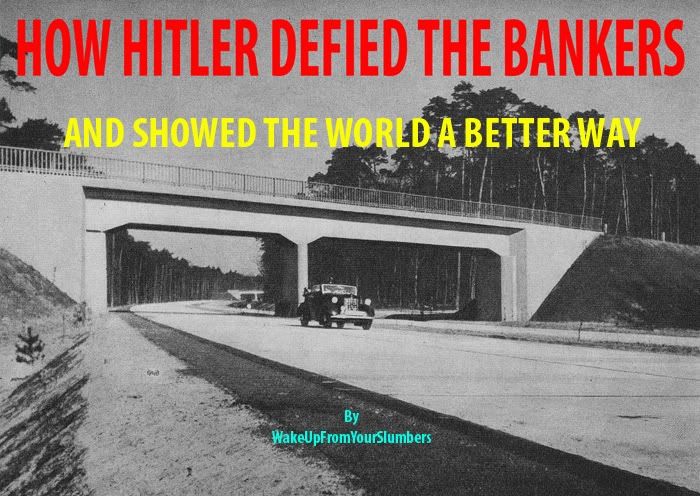
How Hitler defied the bankers
Many people take joy in saying Wall Street and Jewish bankers “financed Hitler.” There is plenty of documented evidence that Wall Street and Jewish bankers did indeed help finance Hitler at first, partly because it allowed the bankers to get rich (as I will describe below) and partly in order to control Stalin.However, when Germany broke free from the bankers, the bankers declared a world war against Germany.
When we look at all the facts, the charge that “Jews financed Hitler” becomes irrelevant. Los Angeles Attorney Ellen Brown discusses this topic in her book Web Of Debt…
When Hitler came to power, Germany was hopelessly broke. The Treaty of Versailles had imposed crushing reparations on the German people, demanding that Germans repay every nation’s costs of the war. These costs totaled three times the value of all the property in Germany.
Private currency speculators caused the German mark to plummet, precipitating one of the worst runaway inflations in modern times. A wheelbarrow full of 100 billion-mark banknotes could not buy a loaf of bread. The national treasury was empty. Countless homes and farms were lost to speculators and to private (Jewish controlled) banks. Germans lived in hovels. They were starving.
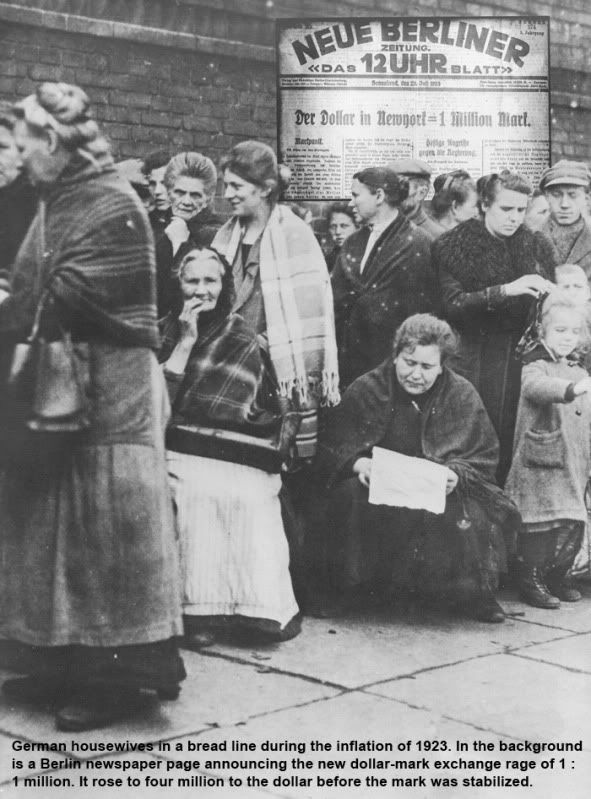
Nothing like this had ever happened before - the total destruction of the national currency, plus the wiping out of people’s savings and businesses. On top of this came a global depression. Germany had no choice but to succumb to debt slavery under international (mainly Jewish) bankers until 1933, when the National Socialists came to power. At that point the German government thwarted the international banking cartels by issuing its own money. World Jewry responded by declaring a global boycott against Germany.
Hitler began a national credit program by devising a plan of public works that included flood control, repair of public buildings and private residences, and construction of new roads, bridges, canals, and port facilities. All these were paid for with money that no longer came from the private international bankers.
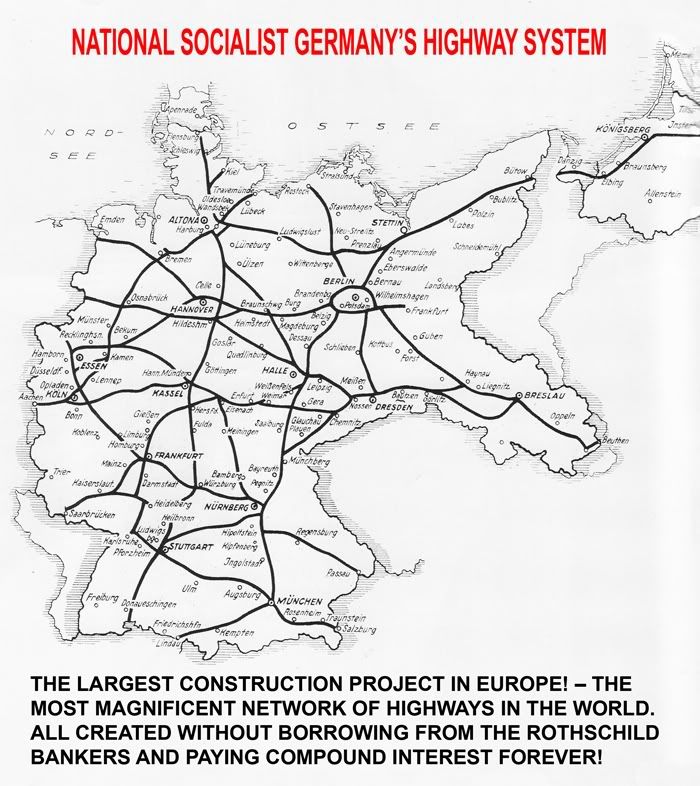
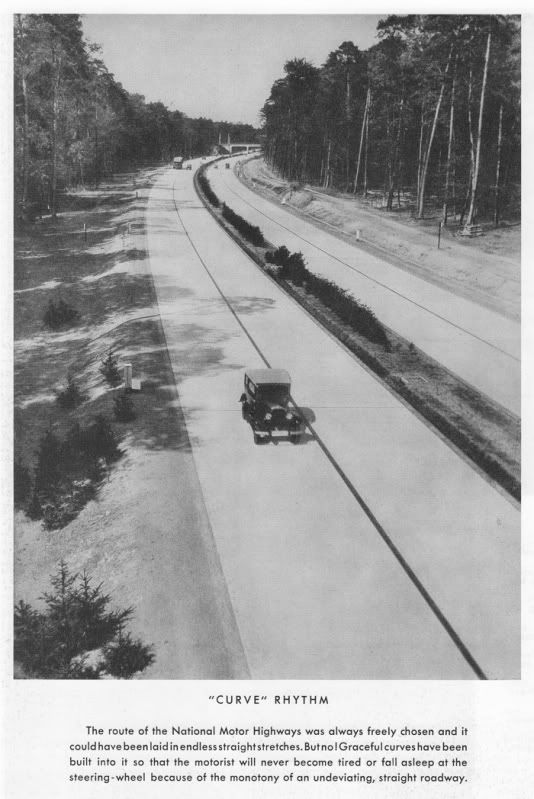
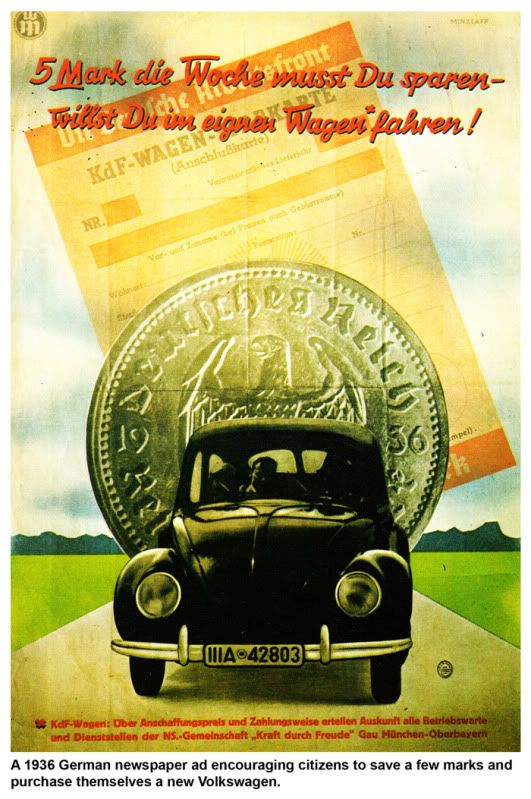
The projected cost of these various programs was fixed at one billion units of the national currency. To pay for this, the German government (not the international bankers) issued bills of exchange, called Labor Treasury Certificates. In this way the National Socialists put millions of people to work, and paid them with Treasury Certificates.
Under the National Socialists, Germany’s money wasn’t backed by gold (which was owned by the international bankers). It was essentially a receipt for labor and materials delivered to the government. Hitler said, “For every mark issued, we required the equivalent of a mark’s worth of work done, or goods produced.” The government paid workers in Certificates. Workers spent those Certificates on other goods and services, thus creating more jobs for more people. In this way the German people climbed out of the crushing debt imposed on them by the international bankers.
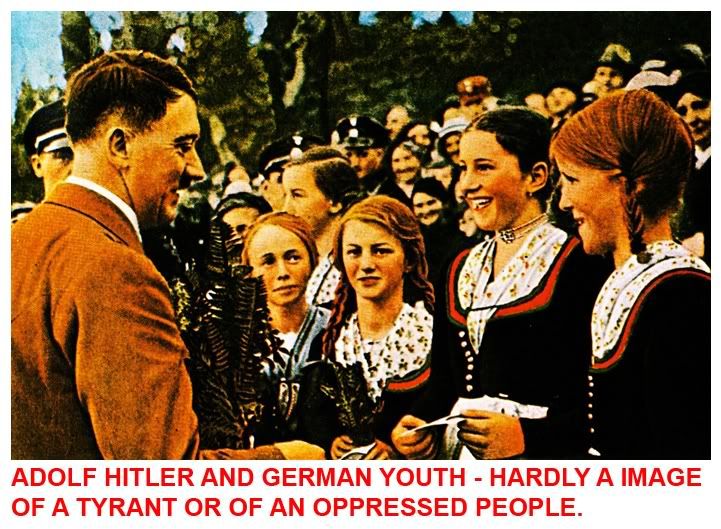
Within two years, the unemployment problem had been solved, and Germany was back on its feet. It had a solid, stable currency, with no debt, and no inflation, at a time when millions of people in the United States and other Western countries (controlled by international bankers) were still out of work. Within five years, Germany went from the poorest nation in Europe to the richest.
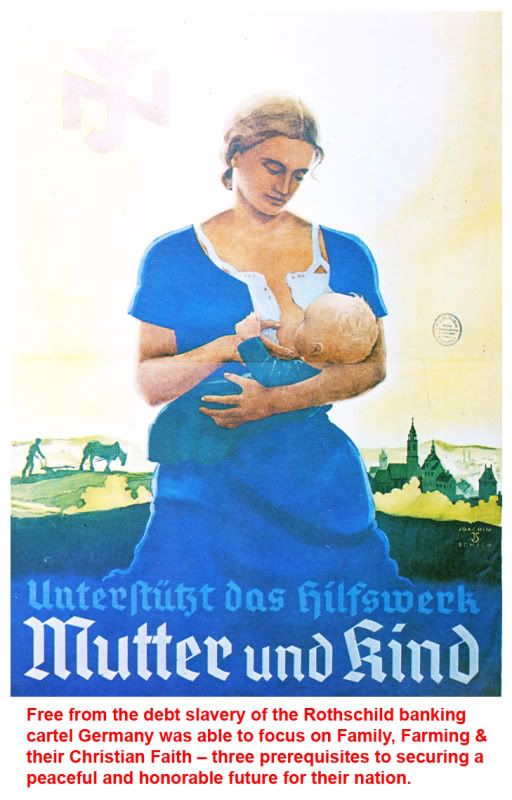
Germany even managed to restore foreign trade, despite the international bankers’ denial of foreign credit to Germany, and despite the global boycott by Jewish-owned industries. Germany succeeded in this by exchanging equipment and commodities directly with other countries, using a barter system that cut the bankers out of the picture. Germany flourished, since barter eliminates national debt and trade deficits. (Venezuela does the same thing today when it trades oil for commodities, plus medical help, and so on. Hence the bankers are trying to squeeze Venezuela.)
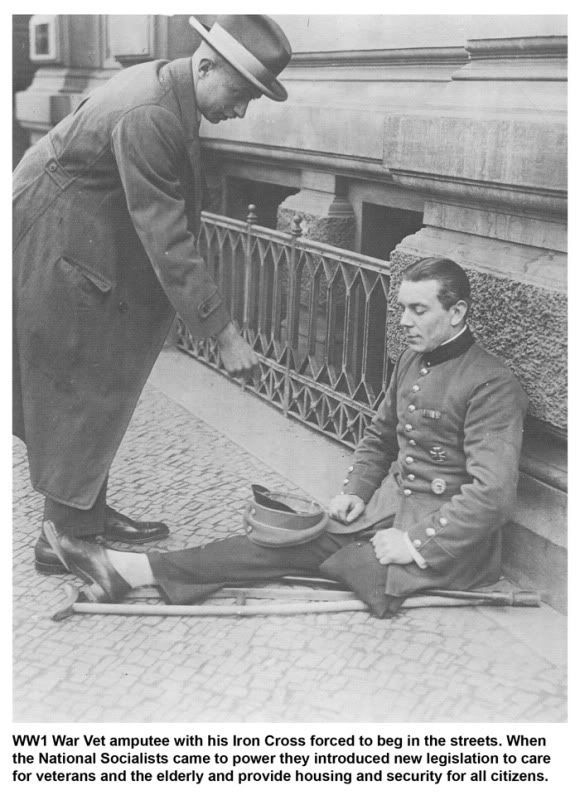
Germany’s economic freedom was short-lived; but it left several monuments, including the famous Autobahn, the world’s first extensive superhighway.
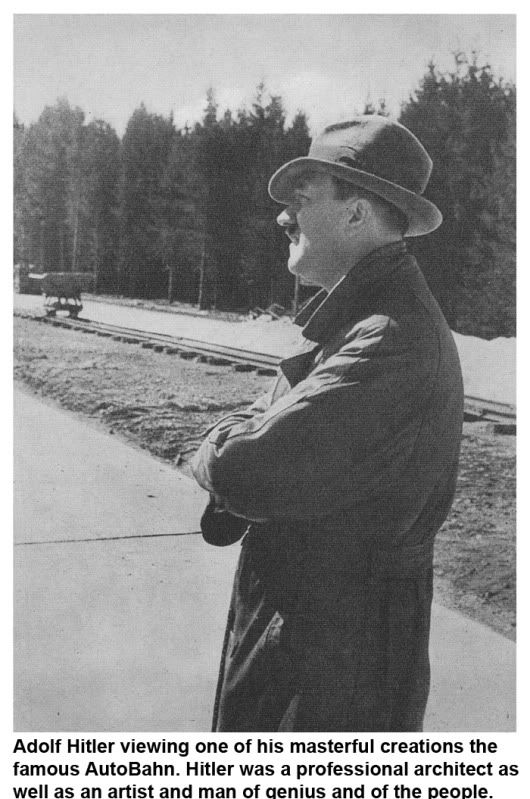
Hjalmar Schacht, who was temporarily head of the German central bank, summed it up thus… An American banker had commented, “Dr. Schacht, you should come to America. We’ve lots of money and that’s real banking.” Schacht replied, “You should come to Berlin. We don’t have money. That’s real banking.”
This economic freedom made Hitler extremely popular with the German people. Germany was rescued from English economic theory, which says that all currency must be borrowed against the gold owned by a private and secretive banking cartel — such as the Federal Reserve, or the Central Bank of Europe — rather than issued by the government for the benefit of the people.
Canadian researcher Dr. Henry Makow (who is Jewish himself) says the main reason why the bankers arranged for a world war against Germany was that Hitler sidestepped the bankers by creating his own money, thereby freeing the German people. Worse, this freedom and prosperity threatened to spread to other nations. Hitler had to be stopped!
Makow quotes from the 1938 interrogation of C. G. Rakovsky, one of the founders of Soviet Bolsevism and a Trotsky intimate. Rakovsky was tried in show trials in the USSR under Stalin. According to Rakovsky, Hitler was at first funded by the international bankers, through Hjalmar Schacht. The bankers financed Hitler in order to control Stalin, who had usurped power from their agent Trotsky. Then Hitler became an even bigger threat than Stalin when Hitler started printing his own money.
(Stalin came to power in 1922, which was eleven years before Hitler came to power.)
Rakovsky said:
“Hitler took over the privilege of manufacturing money, and not only physical moneys, but also financial ones. He took over the machinery of falsification and put it to work for the benefit of the people. Can you possibly imagine what would have come if this had infected a number of other states?” (Henry Makow, “Hitler Did Not Want War,” www.savethemales.com March 21, 2004).
Economist Henry C K Liu writes of Germany’s remarkable transformation:
“The Nazis came to power in 1933 when the German economy was in total collapse, with ruinous war-reparation obligations and zero prospects for foreign investment or credit. Through an independent monetary policy of sovereign credit and a full-employment public-works program, the Third Reich was able to turn a bankrupt Germany, stripped of overseas colonies, into the strongest economy in Europe within four years, even before armament spending began.” (Henry C. K. Liu, “Nazism and the German Economic Miracle,” Asia Times (May 24, 2005).
In Billions for the Bankers, Debts for the People (1984), Sheldon Emry commented:
“Germany issued debt-free and interest-free money from 1935 on, which accounts for Germany’s startling rise from the depression to a world power in five years. The German government financed its entire operations from 1935 to 1945 without gold, and without debt. It took the entire Capitalist and Communist world to destroy the German revolution, and bring Europe back under the heel of the Bankers.”
These facts do not appear in any textbooks today, since Jews own most publishing companies. What does appear is the disastrous runaway inflation suffered in 1923 by the Weimar Republic, which governed Germany from 1919 to 1933. Today’s textbooks use this inflation to twist truth into its opposite. They cite the radical devaluation of the German mark as an example of what goes wrong when governments print their own money, rather than borrow it from private cartels.
In reality, the Weimar financial crisis began with the impossible reparations payments imposed at the Treaty of Versailles. Hjalmar Schacht opposed letting the German government print its own money… “The Treaty of Versailles is a model of ingenious measures for the economic destruction of Germany. Germany could not find any way of holding its head above the water, other than by the inflationary expedient of printing bank notes.”
Schacht echoes the textbook lie that Weimar inflation was caused when the German government printed its own money. However, in his 1967 book The Magic of Money, Schacht let the cat out of the bag by revealing that it was the PRIVATELY-OWNED Reichsbank, not the German government, that was pumping new currency into the economy. Thus, the PRIVATE BANK caused the Weimar hyper-inflation.
Like the U.S. Federal Reserve, the Reichsbank was overseen by appointed government officials, but was operated for private gain. What drove the wartime inflation into hyperinflation was speculation by foreign investors, who sold the mark short, betting on its decreasing value. In the manipulative device known as the short sale, speculators borrow something they don’t own, sell it, and then “cover” by buying it back at the lower price.
Speculation in the German mark was made possible because the PRIVATELY OWNED Reichsbank (not yet under Nazi control) made massive amounts of currency available for borrowing. This currency, like U.S. currency today, was created with accounting entries on the bank’s books. Then the funny-money was lent at compound interest. When the Reichsbank could not keep up with the voracious demand for marks, other private banks were allowed to create marks out of nothing, and to lend them at interest. The result was runaway debt and inflation.
Thus, according to Schacht himself, the German government did not cause the Weimar hyperinflation. On the contrary, the government (under the National Socialists) got hyperinflation under control. The National Socialists put the Reichsbank under strict government regulation, and took prompt corrective measures to eliminate foreign speculation. One of those measures was to eliminate easy access to funny-money loans from private banks. Then Hitler got Germany back on its feet by having the public government issue Treasury Certificates.
Schacht disapproved of this government fiat money, and wound up getting fired as head of the Reichsbank when he refused to issue it. Nonetheless, he acknowledged in his later memoirs that allowing the government to issue the money it needed did not produce the price inflation predicted by classical economic theory, which says that currency must be borrowed from private cartels.
What causes hyper-inflation is uncontrolled speculation. When speculation is coupled with debt (owed to private banking cartels) the result is disaster. On the other hand, when a government issues currency in carefully measured ways, it causes supply and demand to increase together, leaving prices unaffected. Hence there is no inflation, no debt, no unemployment, and no need for income taxes.
Naturally this terrifies the bankers, since it eliminates their powers. It also terrifies Jews, since their control of banking allows them to buy the media, the government, and everything else.
|
|
|
|
|
|
|
|
|
|
|
|
|
Hitler vs. The Banksters
When Hitler came to power, the country was completely, hopelessly broken. The Treaty of Versailles had imposed crushing reparations payments on the German people, who were expected to reimburse the costs of the war for all participants — costs totaling three times the value of all the property in the country.. People were living in hovels and starving. Nothing quite like it had ever happened before - the total destruction of the national currency, wiping out people's savings, their businesses, and the economy generally. Making matters worse, at the end of the decade global depression hit. Germany had no choice but to succumb to debt slavery to international lenders.

Inflation in the Weimar Republic
Or so it seemed. Hitler and the National Socialists, who came to power in 1933, thwarted the international banking cartel by issuing their own money. In this they took their cue from Abraham Lincoln, who funded the American Civil War with government-issued paper money called "Greenbacks." Hitler began his national credit program by devising a plan of public works. Projects earmarked for funding included flood control, repair of public buildings and private residences, and construction of new buildings, roads, bridges, canals, and port facilities. The projected cost of the various programs was fixed at one billion units of the national currency.

One billion non-inflationary bills of exchange, called Labor Treasury Certificates, were then issued against this cost. Millions of people were put to work on these projects, and the workers were paid with the Treasury Certificates. This government-issued money wasn't backed by gold, but it was backed by something of real value. It was essentially a receipt for labor and materials delivered to the government. Hitler said, "for every mark that was issued we required the equivalent of a mark's worth of work done or goods produced." The workers then spent the Certificates on other goods and services, creating more jobs for more people.
Within two years, the unemployment problem had been solved and the country was back on its feet. It had a solid, stable currency, no debt, and no inflation, at a time when millions of people in the United States and other Western countries were still out of work and living on welfare. Germany even managed to restore foreign trade, although it was denied foreign credit and was faced with an economic boycott abroad. It did this by using a barter system: equipment and commodities were exchanged directly with other countries, circumventing the international banks. This system of direct exchange occurred without debt and without trade deficits.
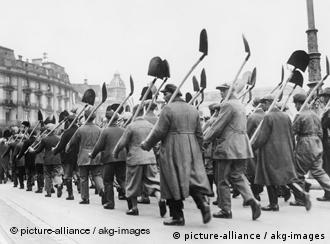
Germany's economic experiment, like Lincoln's, was short-lived; but it left some lasting monuments to its success, including the famous Autobahn, the world's first extensive superhighway. Hjalmar Schacht, who was then head of the German central bank, is quoted in a bit of wit that sums up the German version of the "Greenback" miracle. An American banker had commented, "Dr. Schacht, you should come to America. We've lots of money and that's real banking." Schacht replied, "You should come to Berlin. We don't have money. That's real banking."
In Billions for the Bankers, Debts for the People (1984), Sheldon Emry commented:
Germany issued debt-free and interest-free money from 1935 and on, accounting for its startling rise from the depression to a world power in 5 years. Germany financed its entire government and war operation from 1935 to 1945 without gold and without debt, and it took the whole Capitalist and Communist world to destroy the German power over Europe and bring Europe back under the heel of the Bankers. Such history of money does not even appear in the textbooks of public (government) schools today.
According to Schacht, then, not only did the government not cause the Weimar hyperinflation, but it was the government that got it under control. The Reichsbank was put under strict government regulation, and prompt corrective measures were taken to eliminate foreign speculation, by eliminating easy access to loans of bank-created money. Hitler then got the country back on its feet with his Treasury Certificates issued Greenback-style by the government.
"At the time of the Twelfth century, merry old England, the people had a surplus of woolen clothing. Food and all necessities of life-------------And then bankers came in."
Gen 13:2 And Abram was very rich in cattle, in silver, and in gold.
|
|
|
|
|
|
|
|
|
|
|
|
[size=+4]The Reasons Historians Call
WWII A 'Jewish Creation'[size=+1]
From YesConcepts[size=+1][email protected][size=+1]9-13-2
| [size=+1]At the end of the First World War, Germany was essentially tricked [see Paul Johnson A History of the Modern World (1983) p24 and H Nicholson Peacemaking 1919 (1933) pp13-16] into paying massive reparations to France and other economic competitors and former belligerent countries in terms of the so-called Treaty of Versailles, thanks to the liberal American President Woodrow Wilson. Germany was declared to be solely responsible for the war, in spite of the fact that 'Germany did not plot a European war, did not want one, and made genuine efforts, though too belated, to avert one.' (Professor Sydney B Fay The Origins of the World War (vol. 2 p 552)).[size=+1] [size=+1]As a result of these massive enforced financial reparations, by 1923 the situation in Germany became desperate and inflation on an astronomical scale became the only way out for the government. Printing presses were engaged to print money around the clock. In 1921 the exchange rate was 75 marks to the dollar. By 1924 this had become about 5 trillion marks to the dollar. This virtually destroyed the German middle class (Koestler The God that Failed p 28), reducing any bank savings to a virtual zero.[size=+1] [size=+1]According to Sir Arthur Bryant the British historian (Unfinished Victory (1940 pp. 136-144):[size=+1] [size=+1]'It was the Jews with their international affiliations and their hereditary flair for finance who were best able to seize such opportunities.. They did so with such effect that, even in November 1938, after five years of anti-Semitic legislation and persecution, they still owned, according to the Times correspondent in Berlin, something like a third of the real property in the Reich. Most of it came into their hands during the inflation.. But to those who had lost their all, this bewildering transfer seemed a monstrous injustice. After prolonged sufferings they had now been deprived of their last possessions. They saw them pass into the hands of strangers, many of whom had not shared their sacrifices and who cared little or nothing for their national standards and traditions.. The Jews obtained a wonderful ascendancy in politics, business and the learned professions (in spite of constituting) less than one percent of the population.. The banks, including the Reichsbank and the big private banks, were practically controlled by them. So were the publishing trade, the cinema, the theatres and a large part of the press - all the normal means, in fact, by which public opinion in a civilized country is formed.. The largest newspaper combine in the country with a daily circulation of four millions was a Jewish monopoly.. Every year it became harder and harder for a gentile to gain or keep a foothold in any privileged occupation.. At this time it was not the 'Aryans' who exercised racial discrimination. It was a discrimination that operated without violence. It was exercised by a minority against a majority. There was no persecution, only elimination.. It was the contrast between the wealth enjoyed - and lavishly displayed - by aliens of cosmopolitan tastes, and the poverty and misery of native Germans, that has made anti-Semitism so dangerous and ugly a force in the new Europe. Beggars on horseback are seldom popular, least of all with those whom they have just thrown out of the saddle.'[size=+1] [size=+1]Tough stuff, Sir Arthur! What made you get out of the wrong side of the bed?[size=+1] [size=+1]Strangely enough, in a book unexpectedly published by Princeton University Press in 1984, Sarah Gordon (Hitler, Germans and the "Jewish Question") essentially confirms what Bryant says. According to her, 'Jews were never a large percentage of the total German population; at no time did they exceed 1% of the population during the years 1871-1933.' But she adds 'Jews were overrepresented in business, commerce, and public and private service.. They were especially visible in private banking in Berlin, which in 1923 had 150 private Jewish banks, as opposed to only 11 private non-Jewish banks.. They owned 41% of iron and scrap iron firms and 57% of other metal businesses.. Jews were very active in the stock market, particularly in Berlin, where in 1928 they comprised 80% of the leading members of the stock exchange. By 1933, when the Nazis began eliminating Jews from prominent positions, 85% of the brokers on the Berlin Stock exchange were dismissed because of their "race".. At least a quarter of full professors and instructors (at German universities) had Jewish origins.. In 1905-6 Jewish students comprised 25% of the law and medical students.. In 1931, 50% of the 234 theatre directors in Germany were Jewish, and in Berlin the number was 80%.. In 1929 it was estimated that the per capita income of Jews in Berlin was twice that of other Berlin residents..' etc etc.[size=+1] [size=+1]Arthur Koestler confirms the Jewish over-involvement in German publishing. 'Ullstein's was a kind of super-trust; the largest organization of its kind in Europe, and probably In the world. They published four daily papers in Berlin alone, among these the venerable Vossische Zeitung, founded in the eighteenth century, and the B.Z. am Mittag, an evening paper.. Apart from these, Ullstein's published more than a dozen weekly and monthly periodicals, ran their own news service, their own travel agency, etc., and were one of the leading book publishers. The firm was owned by the brothers Ullstein - they were five, like the original Rothschild brothers, and like them also, they were Jews.' (The God that Failed (1950) ed. RHS Crossman, p 31).[size=+1] [size=+1]Edgar Mowrer, Berlin correspondent for the Chicago Daily News, wrote an anti-German tract called Germany Puts the Clock Back (published as a Penguin Special and reprinted five times between December 1937 and April 1938). He nevertheless notes 'In the all-important administration of Prussia, any number of strategic positions came into the hands of Hebrews.. A telephone conversation between three Jews in Ministerial offices could result in the suspension of any periodical or newspaper in the state.. The Jews came in Germany to play in politics and administration that same considerable part that they had previously won by open competition in business, trade, banking, the Press, the arts, the sciences and the intellectual and cultural life of the country. And thereby the impression was strengthened that Germany, a country with a mission of its own, had fallen into the hands of foreigners.'[size=+1] [size=+1]Mowrer says 'No one who lived through the period from 1919 to 1926 is likely to forget the sexual promiscuity that prevailed.. Throughout a town like Berlin, hotels and pensions made vast fortunes by letting rooms by the hour or day to baggageless, unregistered guests. Hundreds of cabarets, pleasure resorts and the like served for purposes of getting acquainted and acquiring the proper mood..' (pp. 153-4). Bryant describes throngs of child prostitutes outside the doors of the great Berlin hotels and restaurants. He adds 'Most of them (the night clubs and vice-resorts) were owned and managed by Jews. And it was the Jews.. among the promoters of this trade who were remembered in after years.' (pp. 144-5).[size=+1] [size=+1]Douglas Reed, Chief Central European correspondent before WWII for the London Times, was profoundly anti-German and anti-Hitler. But nevertheless he reported: 'I watched the Brown Shirts going from shop to shop with paint pots and daubing on the window panes the word "Jew", in dripping red letters. The Kurfrstendamm was to me a revelation. I knew that Jews were prominent in business life, but I did not know that they almost monopolized important branches of it. Germany had one Jew to one hundred gentiles, said the statistics; but the fashionable Kurfrstendamm, according to the dripping red legends, had about one gentile shop to ninety-nine Jewish ones.' (Reed Insanity Fair (1938) p. 152-3). In Reed's book Disgrace Abounding of the following year he notes 'In the Berlin (of pre-Hitler years) most of the theatres were Jewish-owned or Jewish-leased, most of the leading film and stage actors were Jews, the plays performed were often by German, Austrian or Hungarian Jews and were staged by Jewish film producers, applauded by Jewish dramatic critics in Jewish newspapers.. The Jews are not cleverer than the Gentiles, if by clever you mean good at their jobs. They ruthlessly exploit the common feeling of Jews, first to get a foothold in a particular trade or calling, then to squeeze the non-Jews out of it.. It is not true that Jews are better journalists than Gentiles. They held all the posts on those Berlin papers because the proprietors and editors were Jewish' (pp238-9).[size=+1] [size=+1]The Jewish writer Edwin Black notes 'For example, in Berlin alone, about 75% of the attorneys and nearly as many of the doctors were Jewish.' (Black, The Transfer Agreement (1984) p58.[size=+1] [size=+1]To cap it all, Jews were perceived as dangerous enemies of Germany after Samuel Untermeyer, the leader of the World Jewish Economic Federation, declared war on Germany on August 6 1933. (Edwin Black The Transfer Agreement: the Untold Story of the Secret Pact between the Third Reich and Palestine (1984) pp272-277) According to Black, 'The one man who most embodied the potential death blow to Germany was Samuel Untermeyer.' (p 369). This was the culmination of a worldwide boycott of German goods led by international Jewish organizations. The London Daily Express on March 24, 1933 carried the headline Judea Declares War on Germany. The boycott was particularly motivated by the German imposition of the Nuremberg Laws, which ironically were similar in intent and content to the Jewish cultural exclusivism practiced so visibly in present-day Israel (Hannah Arendt Eichmann in Jerusalem p 7).[size=+1] [size=+1]The origins of World War 2 - the views of four diplomats close to events[size=+1] [size=+1]Joseph P. Kennedy, U.S. Ambassador to Britain during the years immediately preceding WW2 was the father of the famous American Kennedy dynasty. James Forrestal the first US Secretary of Defense (1947-1949) quotes him as saying "Chamberlain (the British Prime Minister) stated that America and the world Jews had forced England into the war". (The Forrestal Diaries ed. Millis, Cassell 1952 p129).[size=+1]Count Jerzy Potocki, the Polish Ambassador in Washington, in a report to the Polish Foreign Office in January 1939, is quoted approvingly by the highly respected British military historian Major-General JFC Fuller. Concerning public opinion in America he says "Above all, propaganda here is entirely in Jewish handswhen bearing public ignorance in mind, their propaganda is so effective that people have no real knowledge of the true state of affairs in Europe It is interesting to observe that in this carefully thought-out campaign no reference at all is made to Soviet Russia. If that country is mentioned, it is referred to in a friendly manner and people are given the impression that Soviet Russia is part of the democratic group of countries Jewry was able not only to establish a dangerous centre in the New World for the dissemination of hatred and enmity, but it also succeeded in dividing the world into two warlike campsPresident Roosevelt has been given the power.. to create huge reserves in armaments for a future war which the Jews are deliberately heading for." (Fuller, JFC: The Decisive Battles of the Western World vol 3 pp 372-374.)[size=+1]Hugh Wilson, the American Ambassador in Berlin until 1938, the year before the war broke out, found anti-Semitism in Germany 'understandable'. This was because before the advent of the Nazis, "the stage, the press, medicine and law [were] crowded with Jewsamong the few with money to splurge, a high proportion [were] Jewsthe leaders of the Bolshevist movement in Russia, a movement desperately feared in Germany, were Jews. One could feel the spreading resentment and hatred." (Hugh Wilson: Diplomat between the Wars, Longmans 1941, quoted in Leonard Mosley, Lindbergh, Hodder 1976).[size=+1]Sir Nevile Henderson, British Ambassador in Berlin 'said further that the hostile attitude in Great Britain was the work of Jews and enemies of the Nazis, which was what Hitler thought himself' (Taylor, AJP: The Origins of the Second World War Penguin 1965, 1987 etc p 324).[size=+1]Hitler wanted to destroy Communism, a fact that earned him the immense hatred and animosity of the Jewish organisations and the media and politicians of the west which they could influence. After all, according to the Jewish writer Chaim Bermant, although Jews formed less than five percent of Russia's population, they formed more than fifty percent of its revolutionaries.[size=+1] [size=+1]'It must be added that most of the leading revolutionaries who convulsed Europe in the final decades of the last century and the first decades of this one, stemmed from prosperous Jewish families.. They were perhaps typified by the father of revolution, Karl Marx.. Thus when, after the chaos of World War I, revolutions broke out all over Europe, Jews were everywhere at the helm; Trotsky, Sverdlov, Kamenev and Zinoviev in Russia, Bela Kun in Hungary, Kurt Eisner in Bavaria, and, most improbable of all, Rosa Luxemburg in Berlin.[size=+1] [size=+1]'To many outside observers, the Russian revolution looked like a Jewish conspiracy, especially when it was followed by Jewish-led revolutionary outbreaks in much of central Europe. The leadership of the Bolshevik Party had a preponderance of Jews.. Of the seven members of the Politburo, the inner cabinet of the country, four, Trotsky (Bronstein), Zinoviev (Radomsky), Kamenev (Rosenfeld) and Sverdlov, were Jews.'[size=+1] [size=+1](Bermant The Jews (1977), chapter 8.[size=+1] [size=+1]Hitler came to power with two main aims, the rectification of the unjust provisions of the Versailles Treaty, and the destruction of the Soviet/ Communist threat to Germany. He had no plans or desire for a larger war of conquest, as Professor AJP Taylor showed in his book The Origins of the Second World War to the disappointment of the professional western political establishment. What occurred in Europe in 1939-41 was the result of unforeseen weaknesses and a tipping of the balance of power, and Hitler was an opportunist 'who took advantages whenever they offered themselves' (Taylor). Britain and France declared war on Germany, not the other way around. Hitler wanted peace with Britain, as the German generals admitted (Basil Liddell Hart, The Other Side of the Hill 1948, Pan Books 1983) with regard to the so-called Halt Order at Dunkirk, where Hitler had the opportunity to capture the entire British Army, but chose not to. Liddell Hart, one of Britain's most respected military historians, quotes the German General von Blumentritt with regard to this Halt Order:[size=+1] [size=+1]"He (Hitler) then astonished us by speaking with admiration of the British Empire, of the necessity for its existence, and of the civilisation that Britain had brought into the world. He remarked, with a shrug of the shoulders, that the creation of its Empire had been achieved by means that were often harsh, but 'where there is planing, there are shavings flying'. He compared the British Empire with the catholic Church - saying they were both essential elements of stability in the world. He said that all he wanted from Britain was that she should acknowledge Germany's position on the Continent. The return of Germany's colonies would be desirable but not essential, and he would even offer to support Britain with troops if she should be involved in difficulties anywhere.." (p 200).[size=+1] [size=+1]According to Liddell Hart, "At the time we believed that the repulse of the Luftwaffe in the 'Battle over Britain' had saved her. That is only part of the explanation, the last part of it. The original cause, which goes much deeper, is that Hitler did not want to conquer England. He took little interest in the invasion preparations, and for weeks did nothing tospur them on; then, after a brief impulse to invade, he veered around again and suspended the preparations. He was preparing, instead, to invade Russia" (p140).[size=+1] [size=+1]David Irving in the foreword to his book The Warpath (1978) refers to "the discovery.. that at no time did this man (Hitler) pose or intend a real threat to Britain or the Empire."[size=+1] [size=+1]This gives a completely different complexion, not only to the war, but to the successful suppression of this information during the war and afterwards. Historians today know only too well where the boundaries lie within which they can paint their pictures of the war and its aftermath, and the consequences of venturing beyond those boundaries, irrespective of the evidence. Unfortunately, only too few of them have been prepared to have the courage to break out of this dreadful straitjacket of official and unofficial censorship.[size=+1] |
|
|
|
|
|
|
|
|
|
|
|
|
|
Esok aku sambung baca.... |
|
|
|
|
|
|
|
|
|
| |
Category: Belia & Informasi
|